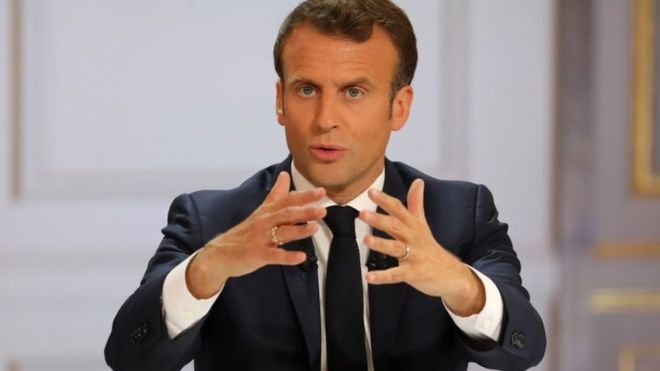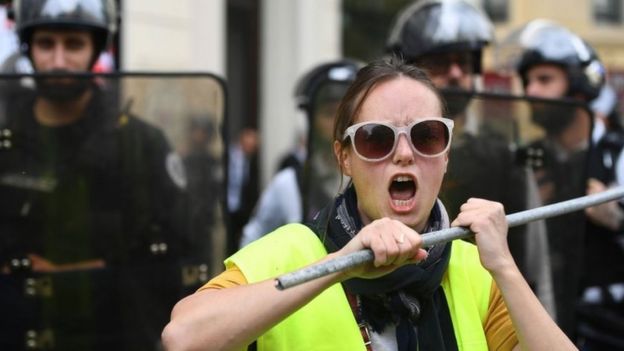France’s Macron responds to yellow vests with promise of reforms

Getty Images
Emmanuel Macron made the live address at the Elysee Palace
French President Emmanuel Macron has given a long-awaited response to the yellow vest protest movement with promises of tax cuts, higher pensions and a reform of the civil service.
Despite insisting that order must return, he acknowledged a “lack of trust” in the establishment.
Protests, sometimes violent, started in November over rises in fuel costs but widened to cover a range of grievances over economic inequality.
Mr Macron said he stood by his reforms.
His speech was originally scheduled for 15 April but was postponed after the devastating fire at Notre-Dame cathedral in Paris.
President Macron recognised that at the core of the movement were “fair demands”.
The protests against the fuel price rises – intended to fund eco-friendly projects – escalated into the gilets jaunes, or yellow vest, movement, a national uprising against what protesters see as economic injustice in France.

GETTY IMAGES
When he was elected in 2017, Mr Macron vowed to fight “the forces of division that undermine France”.
Although he questioned in his speech whether he had taken a “wrong turn”, he insisted that government reforms so far had been right, but not fast enough.
The president said he had “learnt a lot” from national debates held with French citizens across the country – an unforeseen political exercise.
His plans include:
- A “significant cut” in income tax worth €5bn (£4.3bn; $5.6bn), financed by spending cuts and closing company tax loopholes, but the French will have to “work harder”
- Reintroduction of inflation-linking for pensions worth less than €2,000 a month but more working life spent making pension contributions
- More decentralised government
- Extending proportional representation in elections, and making referendums easier to hold
- Abolition of the ENA university, which has trained political leaders and captains of industry but is seen as elitist by many
The president also acknowledged there were concerns in society regarding climate change and immigration.
The president’s announcement is the culmination of what was touted as a “grand debate” with the French people about their concerns.
The latest proposals come on top of changes announced in December at a cost of €10bn.
Those plans, including a government bonus scheme for the low-paid, failed to quell the protests.
A speech for France, not the yellow vests

Yes, there were announcements.
More PR at elections (good news for the far right); fewer MPs; lower income tax for the middle classes; reform (but perhaps not outright abolition) of the National Administration School (ENA); decentralisation of the state administration; longer working lives.
And yes, there was partial admission of responsibility for the breakdown of trust between governed and governing that led to the yellow vests. He should have been more human, less arrogant, Mr Macron admitted.
But such was not the burden from tonight’s marathon press conference.
The overall message was not what must now change, but what must remain the same. And that, says Mr Macron, is the overarching “orientation” of his presidency. The reforms enacted so far, on tax, labour and education, are the right ones and they are working, he said. There will be more to come.
The yellow vests, or the more hard-line among them, will not like it. But they are not Mr Macron’s target audience. The target is France as a whole.